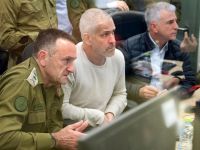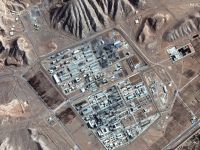More than 1,000 stateless Arabs demanding the right to return to Kuwait from Iraq briefly ventured over border markers on Thursday, an AFP journalist reported.
Helicopters from the 1,309-strong UN Iraq-Kuwait Observers Mission (UNIKOM) hovered over the area while personnel observed the protest, the second since Tuesday, in the demilitarised zone (DMZ) between the two countries.
The protestors, venting their anger at Kuwaiti authorities they accuse of expelling them from the emirate after the 1991 Gulf War, overstepped several UNIKOM-regulated boundary markers, around kilometer 92.
UNIKOM spokesman Abdillahi Zubir Rijal played down any border violations and explained that the helicopter was flying a routine reconnaissance mission as part of the daily monitoring of the border region.
"There might have been some minor infringements, but no crossings as such. Someone can unknowingly go 20 centimeters across the border and not even know that that is classified as a violation," Rijal said.
He estimated the crowd at around 500, but admitted more buses had arrived at the border Thursday morning.
To cries of "Kuwait is our country", the protestors went by bus to UNIKOM headquarters in the border town of Umm Qasr where they delivered a letter condemning Kuwait's refusal to repatriate them, organizers said.
"We are determined to stay at the border until our demands have been met," Shalaan al-Shammari, president of the committee for stateless Arabs in Iraq, told AFP.
Scores of elite Kuwaiti troops moved up to the border with Iraq on Tuesday amid a red alert to stop any bid by the stateless Arabs -- known as "bidoon" in Arabic, meaning "without" -- to cross the frontier.
The protestors have erected 38 tents about 60 meters from the border line, in violation of UNIKOM border rules.
Kuwait has dismissed the protest as a propaganda stunt by Iraqi agents, orchestrated by Baghdad. Officials in the emirate accused the protestors of 200 border violations Tuesday and Wednesday.
Kuwait says 102,000 bidoon live inside the emirate today, down from 225,000 prior to the Iraqi invasion in 1990.
Interior Minister Sheikh Mohammad Khalid al-Sabah said Wednesday that between the end of the 1991 Gulf War, which ended the seven-month-long occupation, and 1993, 26,000 bidoon returned to Iraq from Kuwait.
Some bidoon are from families based without official status in Kuwait for several generations, while others are mostly Arab economic migrants attracted by the oil boom of the 1950s -- SAFWAN, Iraq, (AFP)
© 2000 Al Bawaba (www.albawaba.com)







